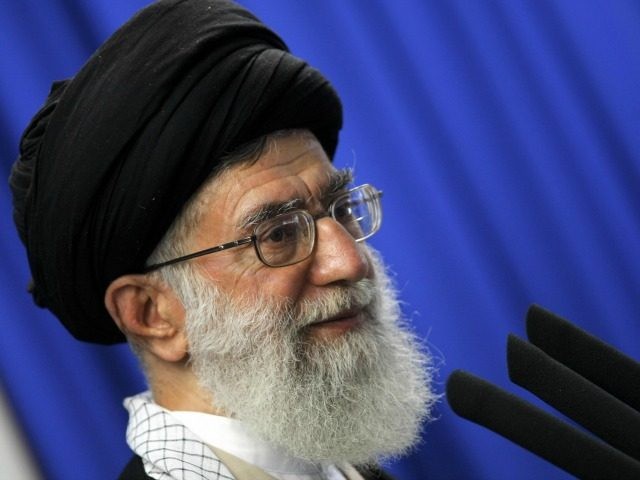The State Department released its annual report on global terrorism and deemed the Islamic Republic of Iran, the focus of a now-historic nuclear agreement, the world’s top sponsor of terrorism, second only to the Islamic State (ISIS, ISIL, Daesh), which was labeled as “the greatest threat globally.”
“Iran remains the leading state sponsor of terrorism globally,” Justin Siberell, the State Department’s acting coordinator for counterterrorism said on Thursday as he briefed reporters on the contents of the report. “Iran continues to provide support to [Hezbollah], Palestinian terrorist groups in Gaza, and various groups in Iraq and throughout the Middle East,” Siberell added. “ISIL remain the greatest terrorism threat globally.”
The report noted that Iran, in 2015, provided “a range of support, including financial, training and equipment, to [terrorist] groups around the world” including Hezbollah and Iraqi Shiite terrorist group Kata’ib Hizaballah (KH), both of which are designated as Foreign Terrorist Organizations (FTO) in the report. The report also lists 58 “Foreign Terrorist Organizations” that include the Islamic State, al-Qaeda and several affiliates, and various branches of both those groups.
It also stated that the leader of the Iranian Revolutionary Guards’ elite Quds Force (IRGC), led by General Qasem Soleimani, was “Iran’s primary mechanism for cultivating and supporting terrorists abroad.”
As part of a series of concessions made to Iran through the Joint Comprehensive Plan of Action (JCPOA), Soleimani had personal sanctions against him dropped. Still, he defied an international travel ban on him and has paid several visits to Russia over the last few months, where the two nations reportedly strategized about the situation in civil war-torn Syria. Reports of Soleimani’s visits and meetings with President Vladimir Putin were denied with as much fortitude as they were reported.
The State Department report listed Sudan and Syria as the other two state sponsors of terrorism. Cuba – which was removed from the list last year – was not present in this year’s catalog. The Revolutionary Armed Forces of Colombia (FARC), whose leaders all enjoy safe harbor from Colombian officials in Havana, is the world’s largest Marxist terrorist organization.
This past December, President Barack Obama announced the “normalization” of relations between the United States and Cuba, noting that the two nations would restore full diplomatic ties for the first time in more than 50 years. President Obama cemented this with his trip to Havana in March.
This past January, Secretary of State John Kerry spoke from CNBC’s “Squawk Box” live from the World Economic Forum in Davos, Switzerland, where he admitted that it was possible, and even likely, that some of the $55 billion the Islamic Republic would receive as a result of ending long-time sanctions against it would wind up in the hands of terrorists:
I think that some of it will end up in the hands of the [Iranian Revolutionary Guard Corps] or of other entities, some of which are labeled terrorists. You know, to some degree, I’m not going to sit here and tell you that every component of that can be prevented. But I can tell you this, right now, we are not seeing the early delivery of funds going to that kind of endeavor at this point in time. I’m sure at some point some of it will.
Last week, Iran marked the 27th anniversary of the death of the founder of the Islamic Republic’s revolution, the Shiite cleric Ruhollah Khomeini. In a speech to mark the ceremony, Supreme Leader Ayatollah Ali Khamenei suggested the United States is a greater threat to Iran than the Islamic State and ruled out cooperation with America to defeat the militant group, despite the imminent threat it poses to the nation.
Former United States Ambassador to the United Nations John Bolton penned an op-ed which appeared in the New York Post on Sunday, where he attributed the current strife the majority of Iran’s 7.7 million-person population is enduring to President Jimmy Carter’s failed foreign policy. Carter infamously backed Khomeini over the late Shah Mohammad Reza Pahlavi.
In his piece, Bolton posits:
The shah was no Jeffersonian democrat, but can anyone seriously argue that 35 years of authoritarian rule by religious extremists have been more favorable to human rights in Iran? And can anyone doubt that Iran’s seismic shift from being a strategic ally of the United States to being a terrorist-sponsoring nuclear proliferator has not left the Middle East and the wider world a more dangerous and unstable place?
Despite a controversial and arguably damning profile of President Obama’s deputy national security adviser, Ben Rhodes, in The New York Times, where Rhodes describes how the White House set up an “echo chamber” of organizations and news reporters to advocate for the nuclear Iran deal, the State Department noted on Thursday that “the United States continues to work to disrupt Iran’s support for terrorism.”
Follow Adelle Nazarian on Twitter @AdelleNaz.

COMMENTS
Please let us know if you're having issues with commenting.